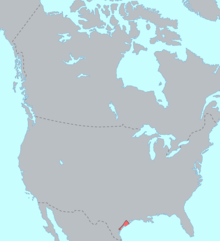Karankawa language
| Karankawa | |
|---|---|
| Keles | |
| Native to | United States |
| Region | Texas coast, from Galveston Island to Corpus Christi |
| Ethnicity | Karankawa people |
| Extinct | 1858 |
|
unclassified | |
| Language codes | |
| ISO 639-3 |
zkk |
zkk | |
| Glottolog |
kara1289[1] |
 Pre-contact distribution of the Karankawa language, lacking the historical inclusion of the Houston-Galveston area | |
Karankawa is the extinct, unclassified language of the Texas coast, where the Karankawa people migrated between the mainland and the barrier islands. It was not closely related to other known languages in the area, many of which are also poorly attested, and may have been a language isolate. A couple hundred words are preserved, collected in 1698, 1720, and 1828; in the 1880s, three lists were collected from non-Karankawa who knew some words. According to Alice Oliver, the Karankawa only had between 600 and 800 words in total; the preserved amount is thus equivalent to between one-third and one-half of the entire language.
Karankawa has sometimes been included with neighboring languages in a Coahuiltecan family, but that is now thought to be spurious.
Phonology
| Bilabial | Alveolar | Palatal | Velar | Glottal | Pharyngeal | Retroflex | |||
|---|---|---|---|---|---|---|---|---|---|
| nor. | lab. | ||||||||
| Plosive | voiceless | p | t | t͡ʃ (tch) | k | ʔ (') | |||
| voiced | b | d | d͡ʒ (dsh) | ɡ | |||||
| Nasal | m | n | |||||||
| Affricate | t͡s (ts) | ||||||||
| Fricative | s | ʃ | ɦ (h) | ħ (x) | |||||
| Approximant | w | l ɫ (ll) | j (y) | ɫᶞ (ḍ) | |||||
| Vibrant | ɽ (r) | ||||||||
| Front | Central | Back | |
|---|---|---|---|
| Close | i | u | |
| Mid | ə (ě) | o oː | |
| Open-mid | ɛ | ɔ ɔ: (â) | |
| Open | ä |
Vocabulary
Though only a few hundred words of the Karankawa language are preserved, the following are selected words recorded by Albert Gatschet, a late Victorian anthropologist and linguist, referenced from the last fluent speakers of the language.[2]
- Nāt’sa "one", counted on the right pinky
- Haikia "two" or "second", counted on the right ring finger
- Kaxayi "three", counted on the right middle finger
- Hayo hak(ě)n "four", or "fourth", counted on the right index finger
- Do-aḍ "Four", or "fourth", literally "deer", counted on the right index finger
- Nāt’sa Behema, "five" or "fifth", literally "First Father", counted on the right thumb
- Hayo Haikia, "Six" or "Sixth", literally "Three two", counted on the left pinky
- Haikia Nāt’sa, "Seven" or "Seventh", literally "Second one", counted on left ring finger
- Haikia Behema, "Eight" or "Eighth", literally "Second father", counted on left middle finger
- Haikia Do-aḍ, "Nine" or "Ninth", literally "Second deer", counted on the left index finger
- (Do-aḍ) Habe "Ten" or "Tenth", literally "Ten(th deer)", counted on the left thumb
- Kaup(ě)n "Speak"
- Yamawe "Man"
- Glo-essen/Glos(ě)n "Boy"
- Kaninma "Woman" or "Mother"
- Ka'da "Girl"
- Glle-i "Water"
- Ahayika "Friend"
- Dōwal ""Sun"
- Kiss "Dog"
- Peka "White"
- Pal/Ma "Black"
- Aknamus "Eat"
- Tcha "See"
- Ye "Go" or "Walk"
References
- ↑ Hammarström, Harald; Forkel, Robert; Haspelmath, Martin, eds. (2017). "Karankawa". Glottolog 3.0. Jena, Germany: Max Planck Institute for the Science of Human History.
- ↑ Gatschet, Albert S. (1891). The Karankawa Indians: The Coast People of Texas. 1. Peabody Museum, Harvard University.